The University of Wisconsin’s Live Free student organization, which promotes the well-being and community integration of students seeking recovery from substance use disorders and other addictive behaviors, hit a freeze when its student leaders graduated and the COVID-19 pandemic hit.
To fulfill the need for an institutionally-supported program, UW launched its own Collegiate Recovery Community, Badger Recovery, this fall to provide support and connections to students in recovery, University Health Services Coordinator of Substance Abuse and Recovery Programming Jenny Damask said.
“It wasn’t a super sustainable model to have a student organization trying to do the work of supporting and building community for students in recovery,” Damask said. “It’s not to say that we won’t have a student group in the future, it’s just that we wanted to put energy right now into launching an institutionally-supported program for students who define their own recovery.”
While people often view recovery through the lens of substance use disorders like alcoholism, Damask said Badger Recovery purposefully leaves the definition of “recovery” open in order to welcome all who want to get involved. Damask said recovery can include eating disorders, trauma and process addictions like gambling.
UW partners receives grant to develop educational pathways for Native American students
For students’ needs to adequately guide and inform the program, Damask said UHS sought student leaders for Badger Recovery.
“I think the major benefit of having students leading other students is that we are the people in recovery, we are the people who understand you and we know the right things to say because we have been there,” Badger Recovery student assistant Jessica Sloane said.
Badger Recovery student assistant Denver Baker said involvement with leadership helped immensely in his own recovery. Baker said opportunities for students to develop leadership skills allow them to become more involved in their own recovery, which helps them to stay sober and enjoy themselves while doing it.
Student leadership also reduces the intimidation factor for those who wish to become involved, Collegiate Recovery Program graduate assistant Samantha Kozlowski said. Kozlowski said it is easier for students to reach out to peers who have similar experiences and life trajectories than it is to connect with professional staff.
UW launches fully online degree program aimed at non-traditional students
“Often, you hear that the opposite of addiction is not sobriety, it’s connection,” Kozlowski said. “[A student-led CRP] gives a whole new perspective to recovery because it’s more of a social and community type of program rather than a clinical approach. We really thrive off of connection, community and building friendships rather than just having a clinical group setting.”
Sloane said Badger Recovery currently offers weekly All Recovery Meetings over Zoom which are inclusive to students in recovery, students who want to be allies and any other student who wants to become involved in the community and their wellness approach.
The program is not completely specific to recovery and is open to recovery allies, Kozlowski said. The team is currently working to incorporate training to teach students how to act as allies, Kozlowski and Damask said.
“I think part of it is not treating them any differently and not ‘othering’ them,” Sloane said. “Still including these types of people and not alienating them, because it’s really easy to forget about your friends who you used to smoke with or who you used to drink with — still reaching out to them.”
UW Extended Campus plans to double online student enrollment within next five years
Baker said for allies, it’s important to refrain from peer pressuring recovering substance abusers to engage in drug or alcohol use. It is crucial for those supporting their friends in recovery to respect their friends’ goals, but extend invitations to social activities regardless.
Sloane said the COVID-19 pandemic made recovery more complicated because isolation has made substance use very accessible. While COVID-19 has provided the perfect opportunity to use, the virus has also made it easier for people to attend recovery meetings and to connect with others, Sloane said.
“COVID puts you in a tough spot because you’re a lot more likely to feel lonely, but I think for a lot of people, Zoom meetings … actually made it easier to attend [recovery meetings] because you don’t need to leave your house now,” Baker said. “It’s made it harder as far as feeling connection, but the opportunities to get connected are maybe greater.”
Having just launched this fall, the program currently consists of a core group of students, but Kozlowski said the team is working to grow and expand their presence on campus. Badger Recovery plans to offer Wellness Workshops and multiple social opportunities in upcoming semesters, as well as establishing a dedicated recovery space on campus, Damask said.
UW students create app for college students to make friends virtually
Baker said he especially wanted to get involved with Badger Recovery because the program is in its infancy. Baker said the program’s possibilities and growth opportunities abound, and he hopes to help build the community so more students can find the important connection and recreational activity it provided for him.
“I think by having more people coming and talking to other sober people, other people in recovery, other allies, we can help them come to understand that a sober life is not a bad life,” Sloane said. “A sober life is not a boring or sad life. You can get just as much, if not more, out of life when you are sober.”
If you’re interested in getting involved with recovery at UW, follow Badger Recovery on Facebook and Instagram, email [email protected] or visit https://www.uhs.wisc.edu/recovery.


















